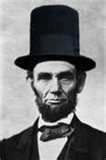The Presidency of Abraham Lincoln
Abraham Lincoln was twice elected to the Presidency but served only one full term, his life cut short by an assassin's bullet mere weeks after his second inauguration. While he was in office, however, he brought great changes to the office, the government, and the country. He expanded the role and jurisdiction of the Presidency, spending large sums of money, without Congressional approval, to buy weapons and other military equipment. He suspended the writ of habeas corpus, meaning that people could be arrested without warrant and held without trial, and used this power to arrest and hold Southern spies so that they could not find sympathetic judges or juries and return to the war. 
He proclaimed a federal blockade of Southern ports. At various times during the war, he assumed direct control of the Union war effort, issuing orders to commanders and asking for regular updates on troop movements. He declared slaves to be free and pushed through three constitutional Amendments that greatly expanded their rights and protections. He expanded the role and influence of the federal government, in the process weakening the influence of the states. He declared that states did not have the right to leave the Union and directed a war effort that resulted in re-Union-ification. He declared martial law in many large cities, to keep the peace at home while war waged on the battlefields of the South. He issued several calls for military volunteers and then calls for a draft, even sending armed soldiers to Northern cities to put down draft riots. In the middle of all this, he also saw to the expansion of the country westward. He established the Department of Agriculture and the Homestead Act of 1862, enabling settlers to get support for their farming and homesteading efforts. He also signed three successive National Banking Acts, along with the first income tax in the nation's history, that resulted in a strong national financial system. In his Cooper Institute Address, on Feb. 27, 1860, he said this: "Let us have faith that right makes might, and in that faith, let us, to the end, dare to do our duty as we understand it." |
|
Social Studies for Kids
copyright 2002–2024
David White




